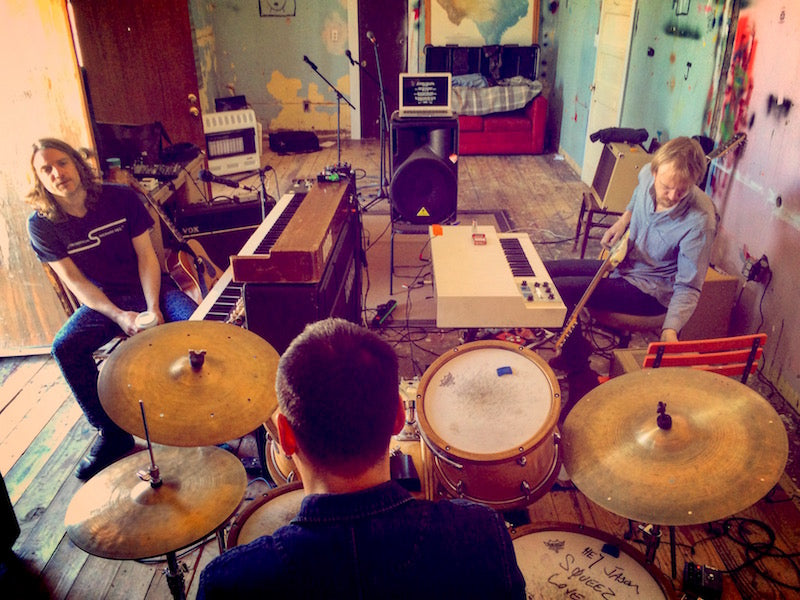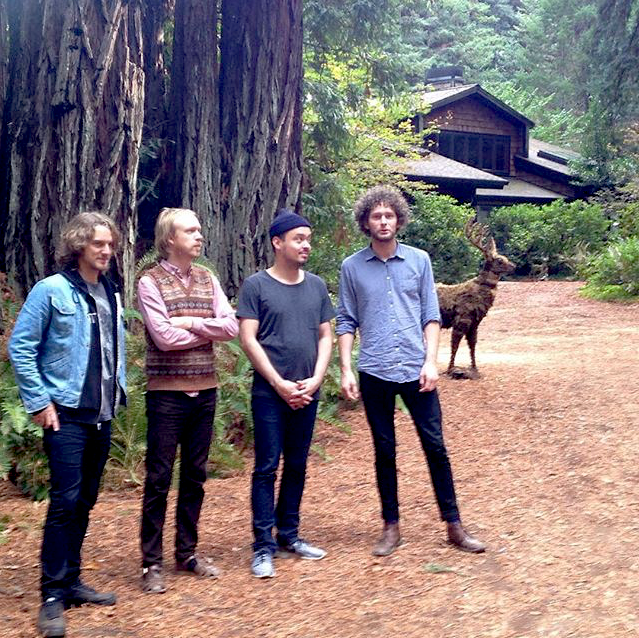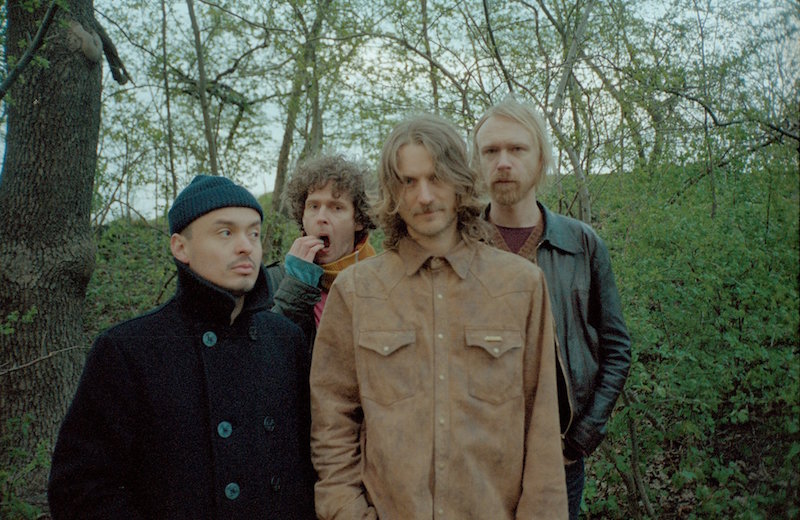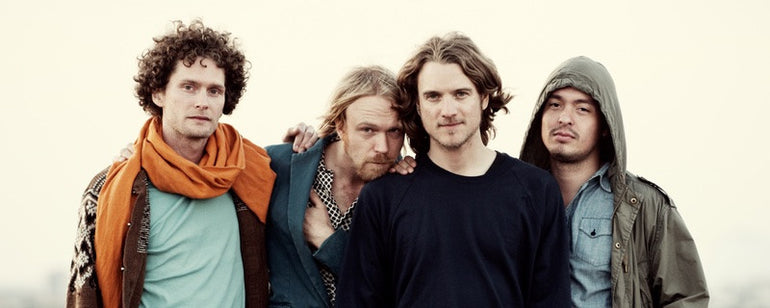This month Stephanie Nicole Smith interviews one of her favorite bands – Dungen. If you aren’t familiar with their catalog of work, perhaps you have been sleeping under a rock. Swedish bred Dungen are quite possibly the best living psych band. “Allas Sak” (2015) is their eighth full length album and possibly their best album, thus far.
If you are lucky enough to find yourself on the west coast they will be playing two shows in early May. Their first show is in southern California at the EchoPlex venue in Los Angeles on May 5th. The next event is in Nicasio, California on a remote private property (yes, the show is open to the public) where songstress Sophia Knapp will be opening for the Swedish psych-wonders on May 7th.
I asked bassist Mattias Gustavsson and guitarist Reine Fiske about their recording process, best & worst tours, favorite gear and other projects they are involved in at the moment. Read the interview below and be sure to follow Dungen on all things social!

What are some of the other projects you guys have worked on and are working on?
MG: I was writing in a band called The Works, back in the early 2000s, before I left to study in Vietnam in the middle of recording our debut album. I’ve written and produced three records as Life on Earth! A project that sort of evolved, or expanded into Our Solar System, which has released two LP’s the last couple of years. One of them just the other week, actually! I also plunged into a solo project last year, called Hi Tom Low Tom, and released a cassette earlier this year. I also write and sing and what not in a pop band called AOP.
RF: The first band I was in was Landberk between 1991-1998. That’s when I started to actually work on trying to write songs, but it was always in collaboration with others. My older musical relationship with Stefan Dimle (of Mellotronen shop/label) led to us forming a one-off thing called Morte Macabre based on our love for soundtracks, mostly from 70’s horror films. Then we started Paatos, which I did one album with, then I got involved in Dungen and Gustav Ejstes a lot - that sort of took over. I have maybe written 5 songs on my own up to now. A current project called The Amazing, which is Christoffer Gunnrup doing the songs, is pretty much like working with Gustav. We get to be involved in the arrangements a bit, but most of it is already written. Anna Järvinen and her producer Mattias Glavå wanted to incorporate Dungen as backing band for her and since 2007 we all have been playing on and off with her, recording and touring her albums, now three in total. Lately, I have been involved with Elephant9 in Norway and I’ve also recorded with one of my absolute favorite bands of all time, the Norwegian band Motorspsycho out of my mom’s hometown of Trondheim. They deserve more praise I think. They have been going since 1989 and made about 20 albums by now.
Where did you spend your “coming of age” years?
MG: My coming of age was a ride! I moved away from home when I was 16 and got heavily depressed for years. I just couldn’t find my place anywhere. Totally lost! I was reading, painting and playing music non-stop as a sort of refuge. I started figuring things out, how to rudimentary understand people basically, in my mid-20’s. In a way, I feel like I am still coming of age.
RF: I was a kid playing guitar a lot, listening to my mom’s mix-tapes with a lot of 60´s music, playing along. My uncle and their cousins in Norway were very influential getting into music that, perhaps, was a little more demanding. I was an early Peter Gabriel-era Genesis-fan, as well as, early Jethro Tull and Pink Floyd. Listening to that when everyone was into hardcore or punk has the typical “nerd” written all over it, but I found something in that complex and epic music. That deepened with the coming of the early 90’s when I sort of left my brief Mudhoney/No Means No/Nirvana period. I listen more to late 80’s, early 90’s music now than I did then, actually. School was o.k., music was always the escape in a way. Music became my muse, my sort-of language.
Where do you live and work now?
MG: I live in Stockholm and play music most of my time.
RF: I live just outside of Sodermalm in Stockholm with my amazing girlfriend and her 14 year old daughter and a rabbit named Oshi. I have always had a day job, but I just decided to quit in order to have more time for music. I’m also pretty fed-up of course. This year is quite busy, so I simply had to make a leap in this direction. We barely can make a living out of the music anyway, so I will work extra hours later this year I think - hope. Sometimes, I think the job has saved me from going out of my mind in a way, it demands certain routine in everyday life that you usually miss out on when you’re your “own boss”.
How long have you been in Dungen? How did the name of the band come about? What does it mean?
MG: I started playing with Dungen sometime between 2001 and 2004. In the beginning it was just the odd gigs here and there as a substitute bass player. They were my friends! But since 2005 it’s been full time.
RF: I’ve been involved with Dungen since 2001. Gustav had the name already. It’s a place in Västergötland where he grew up on the other side of the small hill, or mountain, of Billingen, just out of Skövde. The name means “The Grove”, a small gathering of trees.

How would you describe your current band’s sound?
MG: Dungen sort of… rocks? Maybe the sound now is about some vague feeling of authenticity. Raw basic recording live in the studio as much as possible. Our live shows are a lot about the interplay between us, I think, and to create something ecstatic and ethereal. A release of some kind.
RF: That is for others to decide, I think. We usually get lumped into the psych bag, which is both right and wrong, in a way, it easily puts a stamp on the music. Gustav and the Dungen thing has always been very song-based with possibilities for improv and the odd craziness. Gustav has a strong sense for the structure of songs and he is a master in recording, producing, and creating a certain soundscape with his records.
What bands do you draw inspiration from?
MG: I like Can a lot. And early Kraftwerk, Amon Düül II and the whole german Kraut thing. I am really into the idea of sustained intensity by minimal means. Lately, I have been listening more and more to Ralph Lundsten.
RF: There are so many, The Beatles, The Jimi Hendrix Experience, Tame Impala, and Kevin blew me away when I first heard it. I wanted to join the band sort-of. There was just an immediate click. He sent their first EP to Gustav to eventually work on the mix in 2008, or so, but Gustav thought the sound was already there. Now we are playing with them in New York this June. Amazing! I’ve always been very affected by Radiohead. Their guitars have a serene and very unique weave that is always breathtaking. I’m sort of a record collector and I’ve been into the Scandinavian psych/folk/prog scene of the late 60’s and 70’s since 1990, or so. I guess me and Gustav are the ones mostly affected by those players and the records they made. I’m also into a lot of the garage and beat/psych scene from the 60’s to come out of the U.S. New unearthed stuff still keeps popping up in these reissue times. The U.K around 1971 was just amazing. There were so many bands that made these amazing albums. I’m fascinated by the sound on those records too, some of them sound like they were recorded in cardboard boxes with tons of reverb; stuff like Egg, Arzachel, Julian’s Treatment, East of Eden, Van Der Graaf Generator, Comus, Trees, C.O.B., Blossom Toes, I could go on forever. Brazilian music, Aphex Twin, Fleet Foxes…
Who were your main early influences on your sound?
MG: I don’t know if I even have a particular sound! The bass playing on Van Morrison’s ‘Astral Weeks’ was an early influence. Also, Bella Linnarsson in Mecki Mark Men, and Jojje Wadenius on the Pugh albums.
RF: Kenny Håkansson, Hank Marvin, I guess, and Terje Rypdal. Jimi Hendrix, of course.
What was the make and model of your first instrument? Why did you start playing?
MG: It was an Aria Pro II electric guitar, I have no idea what model. I got it for my eleventh birthday but barely played it until a couple of years later. Everyone in my family was singing and playing some instrument and we had a music room full of instruments in the house where I grew up. I learned how to strum on a guitar when I was twelve because I wanted to be like Jimi Hendrix. That was my first proper instrument, I guess. I spent a weekend learning the chords for his songs from a song book. I still don’t consider myself an instrumentalist, per sè. I don’t know any smart chops, or anything like that, but I feel fairly comfortable with bass and acoustic guitar. I can sing, and I know the basics of keys and drums.
RF: A Swedish made nylon string guitar. That was later combined with a cheap Hondo electric guitar. I was more or less forced into playing the guitar, not that I didn’t want to, there was a lot of music in the house. My stepfather played the guitar and some banjo. But, I wanted to play the piano or the drums. I didn’t like the guitar classes. I had the same woman as my teacher for about 7 years. When I started to find my own kind of music to play along to, I sort-of relaxed more. I could almost read music perfectly for some years, but I sort-of drifted away from it. If I had been given some more intriguing music, maybe I could have progressed in that field. I just went along by ear from there. I was about 15 when I quit the classes. I’m a Mellotron freak, so I dabble in that sometimes. I bought a new digital version of it from my friend who designs and makes them, Markus Resch. They are amazing. The old ones with the actual tape sound different, at least some of the sounds; they lack the attack to the sound when the note is actually starting to play. My dream is to have a MK2 Mellotron, that is known for being used by The Moody Blues, The Beatles and King Crimson, but the one I could actually get is about a hundred grand, or so. Maybe next life, or finding a sponsor.
What is your favorite recording setup like?
MG: I am hopelessly adaptable when it comes to those things, and have a blind spot when it comes to gear, I play on whatever. Although, it is nice to be in a spacious studio with some well-rounded old tube amp and a vintage Rickenbacker or Hofner that plays like a dream. But, it all depends on the music and the vibe. Most of the time I record at home with my lap top and use only software instruments and sing through the built-in mic. The setting is always more important than the setup.
RF: It differs, it depends on what you want to create of course. Usually when recording there is often combo-amps involved, in a live-setting you usually want or need some extra headroom to the sound, so that’s when the bigger amps come in. I like the early 70’s Fender Super Reverb amps. On the latest Dungen record our producer, Mattias Glavå, made me use his old Supro-amp which sounds amazing when recorded with the right microphones and set through his pre-amps and all his assorted vintage gadgets. As for pedals, I use an old Carlin Compressor, the Germanium Fuzz-Face, a Cry-Baby wah-wah, a Roger Mayer Octavia and assorted Fuzz pedals. Everything goes straight into the Klemt Echolette NG-51 tape-echo that I always used, at least as a pre-amp. Mattias put the guitar through a harmonizer and a Leslie cabinet on this album, which is o.k, but I usually want the sound that I actually record. Just very simple, I’m not into Flanger or Phaser effects that much, but if it’s used with finesse it can be great. I’m really looking for a clone of a Vox Tonebender Mk1, a sound that I just have to get my hands on.
If you had to pick one pedal you could not live without which would that be?
MG: I couldn't live without my tuner.
RF: Probably the Fuzz-Face.
Best tour you've been on and why?
MG: The tour we did last fall was amazing! Something clicked within the band! Every show felt better than the last! But I just absolutely love being on tour in general! It’s the best!
RF: Hard to say. Dungen is the only band that I’ve been doing extensive touring with, but perhaps the 2009 tour that we did partly together with Fleet Foxes was a certain high point. Everything was sort-of in the right place by then. Maybe we are more interesting musically now, since we have tried to stretch the set so that it transcends the audience, and hopefully ourselves, into more of a “journey” through all the albums. You can play for two hours, but who is interested after 1 hour? Which songs have to be played and which songs should we agree on to play? I just want everything to dig deeper, I want the music to go places. That’s an art in itself, just putting together the right “set” for the evening, or for an entire tour for that matter. We are still working on it.
Worst show you've ever played?
MG: Touring with Dungen has been a somewhat confusing apparatus all along. I have often wished we had rehearsed more. In the beginning we were touring maybe a little too much, a little too soon, and there have been multiple shows where someone has had an on-stage melt down and instruments have been thrown and that sort of thing. Although, that still happens occasionally. In the end, I think it’s all for the good. Just do whatever you do with all of your being. It must be real, otherwise it’s pointless.
RF: I would love to think that festivals, for instance, were great to play, but they’re usually not. It’s not like in the Glastonbury Fayre 1971 film, you know. And it’s usually a lot of stress and not very good stage sound involved playing live sometimes. It takes a lot of routine, and skill of course, to actually be able to perform and try to feel relaxed and focused. Lately we’ve had the opportunity to work with our current amazing FOH man Joel Modin, so he has a lot of input and output on the live-sound, but I’m extremely picky on my own sound and how the sound and vibe is on stage since you really need to play off that to create an atmosphere. The worst gigs have been when those things aren’t even close to be working.

Do you have any advice for bands just starting to get into tour mode?
RF: Try to sleep (sometimes), don’t drink too much (sometimes), and don’t smoke too much (if you’re singing), and don’t be too hard on yourself. On tour, things can get weird, but I sort-of like the journey of it. Wandering off into the traveling mode, too - Thinking, reading, listening to music, talking, looking out the window, trying to find descent food, discuss the last gig and what could be changed. It’s like being in a capsule sometimes. I don’t mean that we are on a mission, but it’s close to something similar to that in a way. When you have a good night, there is such an amazing feeling of fulfillment, hopefully shared, for me anyway. Dungen means a lot to me, and I think especially me and Gustav have strong bonds because of this music, and the stuff that we love, and are influenced by, and the whole journey it’s been and still is. It’s natural when you’ve been doing it for 15 years without starting to hate each other, but it’s been a lot of hassle and hard feelings along the way, too.
Which players should guitarists study and learn from?
MG: Everyone needs to study Reine Fiske!
RF: Perhaps, guitarists in general tend to listen too much to other guitar players. I do. I can just freak out on certain players like Eddie Hazel, Ollie Halsall, or even early Eddie Van Halen, because they’re all so uncompromising, awesome and original, but I get even more from listening to sax players or kora players. My favourite guitar players are, perhaps, not the most “flashy” ones. Terje Rypdal, for instance, writes symphonies and was originally a flute player, Ralph Towner was a piano-player, and Egberto Gismonti, I think.
Where do you find your inspiration for song ideas?
MG: They pop up in my head when I least expect it. I can be reading something, or react to a line in a movie, or hear the sound of a particular drum kit and just feel something. I collect these ideas and let them ripen and mix and get mashed up in my head for a while before I begin to write, and when I do it’s usually quite a fast process.
RF: I don’t write that many songs. I try to record some short ideas on the iPhone sometimes, but what comes along, comes along. I think it’s about “noodling”. You fiddle around with some notes and chords, maybe from listening to something you love really intensely for a while and wanting to find that out and try to copy it. Suddenly, something else just comes out. I’m going to try to learn logic better so I can start to record some things. I think that would be good for me, trying to write some sounds.
What's in your record player/headphones this week?
MG: This week I have been listening to "Olé" by John Coltrane, "Ptah The El Daoud" by Alice Coltrane, "Worn Copy" by Ariel Pink, "Strömkarlen" by Ralph Lundsten, among other things.
RF: Dream's Get Dreamy, Terje Rypdal’s psych-band from 1967. I’ve been working on the liner notes for a new re-issue of it that comes out in Norway this Fall. It’s sort of hard work to try to do that, but also an honor of course. I’ve done these kinds of things before with various Swedish albums, but those are nearer to me in a way, and I sort-of know quite a lot about that history. This one is harder, but I’m also going to do the same with Terje’s first solo album, Bleak House. That’s even more hard work, but I’m going to send him some proper questions about his musical beginnings to try and make it into something worthy of that amazing album. Apart from that, I’ve been listening to Freedom’s Children’s Astra a lot. I bought the original LP a while back. It’s a totally crazy album. Amazing. And I’ve been into Marcos Valle’s album Viola Enluarada trying to play the songs on guitar. Technically, I’m so bad at the “jazzier” stuff.
What are you currently working on / any new releases in the works?
MG: When we are not on tour with Dungen, I am writing and recording new songs with AOP and Hi Tom Low Tom. We are also in the finishing stages of the next Our Solar System album.
RF: I’ve actually been hanging around in my friend Fredrik Swahn’s studio and did recordings with Melody Prochet for a possible new Melody’s Echo Chamber album. It’s fun, there are some nice songs in the making, I think. It takes time to sculpture songs and finding a sound or colour for the production. I’ve also done some recordings with The Amazing in the same studio. Dungen is releasing an instrumental album later this year based on the music we did for the silent movie version of ‘The Adventures of Prince Achmed’ by Lotte Reiniger from 1927.
Where's the best place people can find more information about you / your band?
RF: The Internet of course, or through buying/ listening to one of the albums and trying to figure us out.
MG: Facebook is probably the best place to go.
Stephanie Nicole Smith is a visual artist and make up artist in Los Angeles, CA. You can find her work at stephanienicolesmith.com and follow her @stephanienicolesmith. She currently contributes to the Original Fuzz Magazine via her Five Minutes series.

